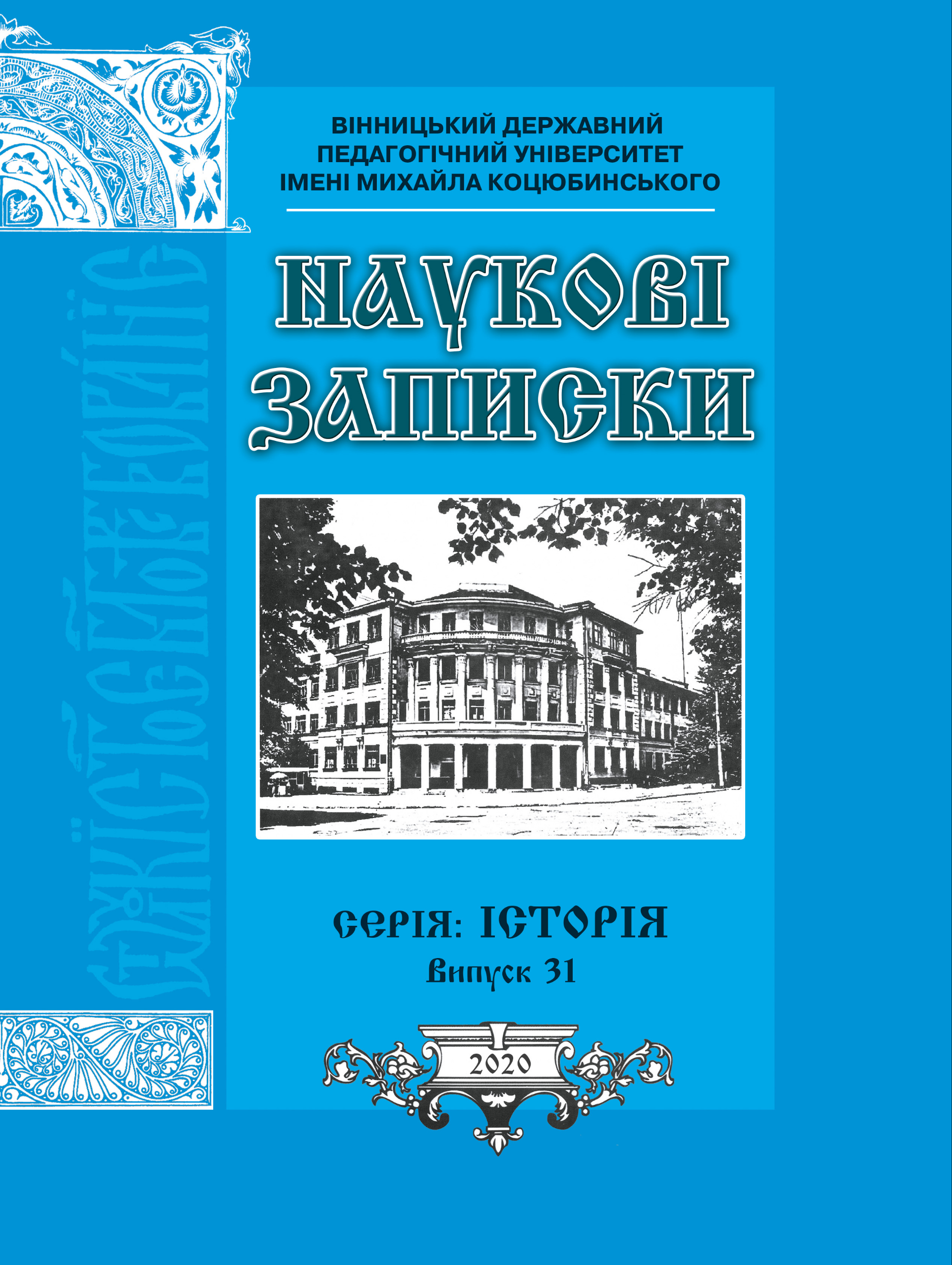Abstract
The purpose of the article is to shed light on the main reasons for the emergence of the "Ukrainian change of education", the relationship of various groups of Ukrainian emigration with the representatives of Soviet power in the first half of the 1920s. The methodology the research is based on the combination of the principles of historicism, systematic, objectivity and impartiality with general scientific (induction and deduction, analysis and synthesis) and special historical (historical-typological, problem-chronological, historical-comparative) methods of research. The scientific novelty is that the author for the first time in a separate study made an attempt to analyze the "Ukrainian change of education" as a socio-political current among the Ukrainian expatriate intelligentsia, who supported the proclamation of national-cultural construction in the Ukrainian SSR proclaimed by the Soviet authorities. The factors that influenced the decision of some Ukrainian expatriates to return to Ukraine were identified. It is analyzed how change education influenced the differentiation of different groups of expatriate intellectuals in their attitude to political, socio-economic and cultural processes in the Ukrainian SSR. Conclusions. The return to Ukraine of "change-makers" intensified the movement for building a national culture in the republic. The broad Ukrainian circles that had previously avoided cooperation with the Soviet authorities began to participate in the work of state bodies and public organizations. There is an active involvement of the Ukrainian intelligentsia in scientific work, literature, teaching and more. This gave impetus to the activation of all cultural life: there are various literary organizations and groups, publishers, theaters are emerging, and new cinema is being born. Undoubtedly, “change of education” led to the weakening of Ukrainian emigration forces, which continued to fight for the will of the Ukrainian people with available means. The Ukrainian Shift men were constantly monitored by the Soviet punitive bodies and subsequently fell victim to the first wave of Stalinist mass repression.
References
Бюллетень. (1924). Бюллетень VIII Всеукраинской конференции КП(б)У (12-17 мая 1924 р.) : Стеногр. Харков: Пролетарий, 231 с.
Верстюк, В.Ф., Скальський, В.В., Файзулін, Я.М. (2011). - Юрій Тютюнник: від «Двійки» до ГПУ. Документи і матеріали / Інститут історії України НАН України. Київ: Дух і літера, 616 с.
Винниченко, В. (1926). Поворот на Україну. Львів-Пшібра м: Друк. Наук. тов. ім. Т.Г. Шевченка, 34 с.
Гамрецький, І.С., Лациба,В.П., Нешик, С.С., Білоконь,В.І., Бухін,К.Д., & Васильєв, В.Ю. (2006). Реабілітовані історією. У двадцяти семи томах. Вінницька область. Кн. 1. Вінниця: ДП «ДКФ», 908 с.
ДАВіО – Державний архів Вінницької області.
Даниленко О. (2003). Роль українського громадського комітету в соціальній адаптації емігрантів. Проблеми історії України: факти, судження, пошуки: Міжвід. зб. наук. пр.- Вип. 9, С. 278-295.
Єфіменко Г.,Приймаченко Я., Юркова О. (2017). Україна радянська. Ілюзії та катастрофи «комуністичного раю»1917-1938 роки. Харків: Клуб сімейного дозвілля, 352.
Касьянов, Г. В., & Даниленко, В. М. (1991). Сталінізм і українська інтелігенція (20-30-і роки). Київ: Наукова думка, 96 с.
Kemp-Welch, А. (1978). «New Economic Policy in culture» and its Enemits. Founal of Contemporary History, 3, C. 449- 465.
Лозицький В.С. (2008). Українська політична еміграція 1919-1945: документи і матеріали / Інститут політичних і етнонаціональних досліджень ім. І.Ф. Кураса,Центральний державний архів громадських об’єднанань України. Київ: Парламентське видавництво, 928 с.
Петлюра, С. (1979). Статті, листи, документи. Т. 2. / Українська Вільна Академія Наук у США, Бібліотека ім. Симона Петлюри в Парижі. Нью-Йорк: Українська Вільна Академія Наук у США, 627 с.
Піскун, В. М. (2006). Політичний вибір української еміграції (20-ті роки ХХ століття): Монографія. Київ, Нью-Йорк : «МП Леся», 672 с.
Подкур, Р., Васильєв, В., Кравченко, П., & Петренко В. (2013). Настрої та поведінка населення Поділля в умовах сталінської революції «згори». 1928-1940. Збірник документів та матеріалів. Київ: Інститут історії України НАН України, 528 с.
Портнов, А.В. (2008). Наука у вигнанні: Наукова і освітня діяльність української еміграції в міжвоєнній Польщі (1919–1939). Харків: ХІФТ, 256 с.
Мазипчук, М. (2018). «Наши жовто-блакитные вехи существенно отличаются от трехцветных»: феномен «зміновіхівства» в українській політичній еміграції. https://commons.com.ua/uk/fenomen-zminovihivstva-v-ukrayinskij-politichnij-emigraciyi/
Рубльов, О.С. (2004). Західноукраїнська інтелігенція у загальнонаціональних політичних та культурних процесах (1914–1939). Київ: Інститут історії України НАН України, 648 с.
Севастьянов, А. (1988). Интеллигенция, что впереди? Литературная газета, 21 сентября.
ЦДАГОУ – Центральний державний архів громадських об’єднань України.

This work is licensed under a Creative Commons Attribution 4.0 International License.
Copyright (c) 2020 Scientific Papers of the Vinnytsia Mykhailo Kotsiubynskyi State Pedagogical University. Series: History





